仁爱版英语七年级下全部知识点总结
- 格式:doc
- 大小:325.50 KB
- 文档页数:42
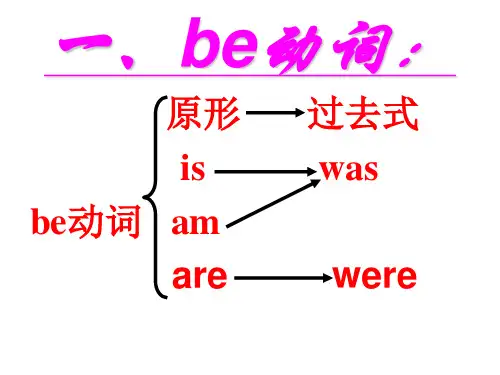
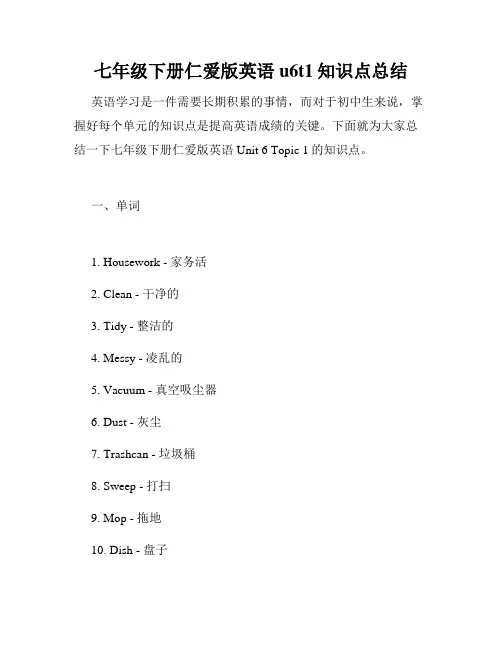
七年级下册仁爱版英语u6t1知识点总结英语学习是一件需要长期积累的事情,而对于初中生来说,掌握好每个单元的知识点是提高英语成绩的关键。
下面就为大家总结一下七年级下册仁爱版英语Unit 6 Topic 1的知识点。
一、单词1. Housework - 家务活2. Clean - 干净的3. Tidy - 整洁的4. Messy - 凌乱的5. Vacuum - 真空吸尘器6. Dust - 灰尘7. Trashcan - 垃圾桶8. Sweep - 打扫9. Mop - 拖地10. Dish - 盘子二、短语1. Do the housework - 做家务2. Clean the room - 打扫房间3. Make the bed - 整理床铺4. Take out the trash - 拿出垃圾5. Vacuum the carpet - 吸地毯6. Dust the furniture - 擦家具7. Do the dishes - 洗碗8. Tidy up the room - 整理房间三、句子1. Could you please help me do the housework? - 你能帮我做家务吗?2. I need to clean my room. - 我需要打扫房间。
3. Let's tidy up the living room first. - 让我们先整理一下客厅。
4. He always makes his bed when he gets up. - 他每天起床后都会整理床铺。
5. Don't forget to take out the trash. - 别忘了拿出垃圾。
6. She likes to dust the furniture with a soft cloth. - 她喜欢用软布擦家具。
7. My mom always does the dishes after dinner. - 我妈妈总是在晚饭后洗碗。
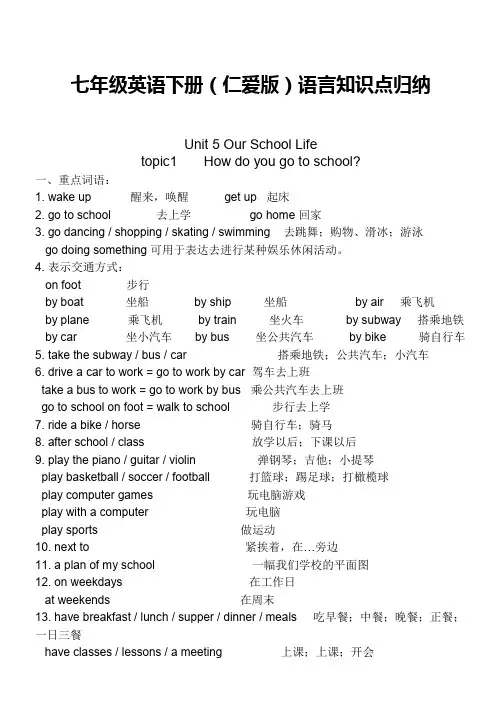
七年级英语下册(仁爱版)语言知识点归纳Unit 5 Our School Lifetopic1 How do you go to school?一、重点词语:1. wake up 醒来,唤醒 get up 起床2. go to school 去上学 go home 回家3. go dancing / shopping / skating / swimming 去跳舞;购物、滑冰;游泳go doing something 可用于表达去进行某种娱乐休闲活动。
4. 表示交通方式:on foot 步行by boat 坐船 by ship 坐船 by air 乘飞机by plane 乘飞机 by train 坐火车 by subway 搭乘地铁by car 坐小汽车 by bus 坐公共汽车 by bike 骑自行车5. take the subway / bus / car 搭乘地铁;公共汽车;小汽车6. drive a car to work = go to work by car 驾车去上班take a bus to work = go to work by bus 乘公共汽车去上班go to school on foot = walk to school 步行去上学7. ride a bike / horse 骑自行车;骑马8. after school / class 放学以后;下课以后9. play the piano / guitar / violin 弹钢琴;吉他;小提琴play basketball / soccer / football 打篮球;踢足球;打橄榄球play computer games 玩电脑游戏play with a computer 玩电脑play sports 做运动10. next to 紧挨着,在…旁边11. a plan of my school 一幅我们学校的平面图12. on weekdays 在工作日at weekends 在周末13. have breakfast / lunch / supper / dinner / meals 吃早餐;中餐;晚餐;正餐;一日三餐have classes / lessons / a meeting 上课;上课;开会14. watch TV / movies / games / the animals 看电视;电影;比赛;动物read novels / newspapers / books 看小说;报纸;书15. wash one’s face / clothes 洗脸;衣服16. 反义词:up – down, early – late 近义词:quickly – fastget up early 早起 be late for 迟到17. the first / second / third / fourth day 第一;二;三;四天18. clean the house 打扫房子19. 表示建筑物(尤其学校建筑物):on the playground 在操场at school / home / table 在学校;家里;桌旁in a computer room / teachers’ of fice / classroom building / gym / library / lab / canteen在电脑室;教师办公室;教学楼;体操馆;图书馆;实验室;食堂20. around six o’clock = at about six o’clock大约在六点21. 频率副词:never, seldom, sometimes, often, usually, always二、重点句型:1. It’s time to get up.该起床的时候了。
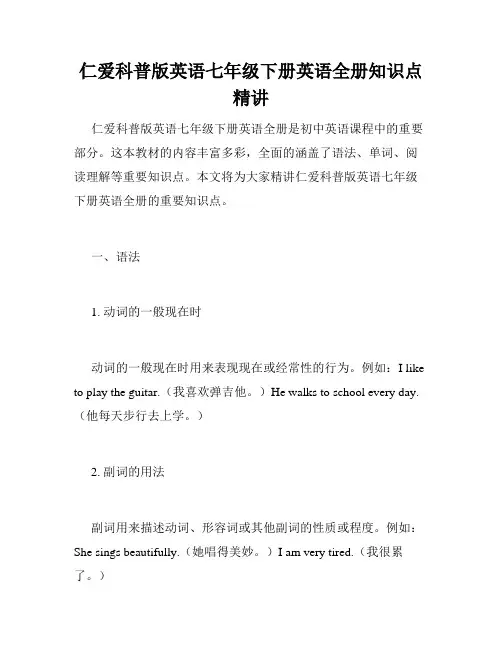
仁爱科普版英语七年级下册英语全册知识点精讲仁爱科普版英语七年级下册英语全册是初中英语课程中的重要部分。
这本教材的内容丰富多彩,全面的涵盖了语法、单词、阅读理解等重要知识点。
本文将为大家精讲仁爱科普版英语七年级下册英语全册的重要知识点。
一、语法1. 动词的一般现在时动词的一般现在时用来表现现在或经常性的行为。
例如:I like to play the guitar.(我喜欢弹吉他。
)He walks to school every day.(他每天步行去上学。
)2. 副词的用法副词用来描述动词、形容词或其他副词的性质或程度。
例如:She sings beautifully.(她唱得美妙。
)I am very tired.(我很累了。
)3. 名词的数名词的数分为单数和复数。
复数通常在名词的末尾加“-s”。
例如:Tom has two cats.(汤姆有两只猫。
)My sister has three brothers.(我姐姐有三个兄弟。
)4. 代词的用法代词代替名词,分为主格、宾格和所有格。
例如:She is my sister.(她是我的姐姐。
)I love her.(我爱她。
)This is his book.(这是他的书。
)二、单词1. 常用动词常用动词包括be(是、在)、do(做)、have(有)、go (去)、come(来)、like(喜欢)、play(玩)、take(拿)、see(看见)、want(想要)等。
2. 数字数字包括1-100以及其他重要数字的表达方式。
例如:1(one)、2(two)、10(ten)、15(fifteen)、100(one hundred)等。
3. 学科用语学科用语包括语文、数学、英语等课程中的基本单词及相关词汇。
例如:books(书)、teacher(老师)、pencil(铅笔)、geometry(几何)、algebra(代数)、history(历史)、geography (地理)等。
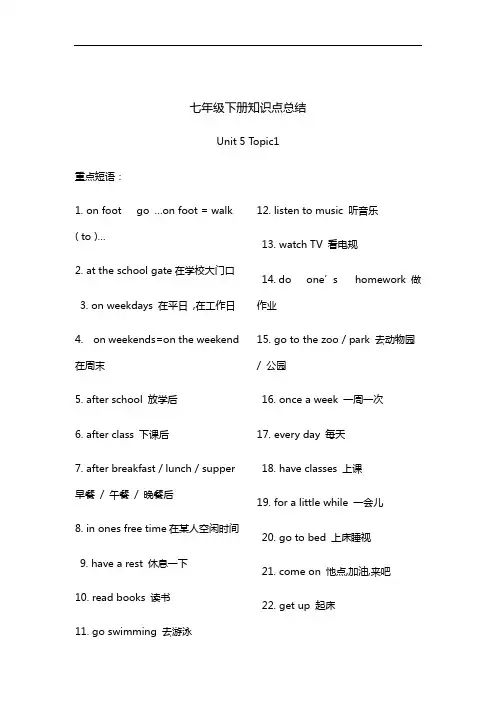
七年级下册知识点总结Unit 5 Topic1重点短语:1. on foot go …on foot = walk ( to )…2. at the school gate在学校大门口3. on weekdays 在平日,在工作日4. on weekends=on the weekend 在周末5. after school 放学后6. after class 下课后7. after breakfast / lunch / supper 早餐/ 午餐/ 晚餐后8. in ones free time在某人空闲时间9. have a rest 休息一下10. read books 读书11. go swimming 去游泳12. listen to music 听音乐13. watch TV 看电规14. do one’s homework 做作业15. go to the zoo / park 去动物园/ 公园16. once a week 一周一次17. every day 每天18. have classes 上课19. for a little while 一会儿20. go to bed 上床睡视21. come on 忚点,加油,来吧22. get up 起床23. talk with / to sb.不某人谈话26. and so on ……等等24. at school 在学校、在上课25. go to school 去上学重点句型 1. Happy New Year! The same to you.2. Your new bike looks very nice. Thank you.3. How do you usually come to school? —I usually come to school by subway.4. How often do you go to the library?5. —Once/Twice/Three times a week/Very often/Every day/Sedom6. The early bird catches the work. (谚语) 笨鸟先飞7. Work / Study must come first. 工作/ 学习必须放在第一位8. Classes begin at eight. =Class begins at eight.9. What time does the class begin? / What time do the classes begin?10. We have no more time. 我们没有更多的时间了。
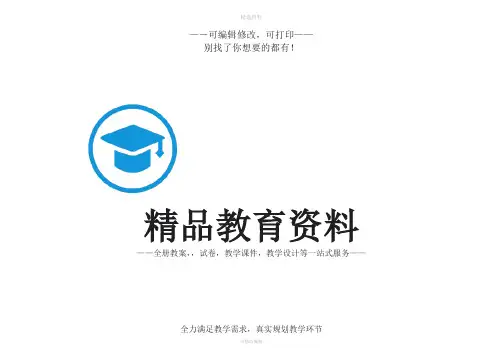
—-可编辑修改,可打印——别找了你想要的都有!精品教育资料——全册教案,,试卷,教学课件,教学设计等一站式服务——全力满足教学需求,真实规划教学环节最新全面教学资源,打造完美教学模式Unit 5 Our School Lifetopic1 How do you go to school?一、重点词语:1. wake up 醒来,唤醒get up 起床2. go to school 去上学go home 回家3. go dancing / shopping / skating / swimming 去跳舞;购物、滑冰;游泳go doing something 可用于表达去进行某种娱乐休闲活动。
4. 表示交通方式:on foot 步行by boat 坐船by ship 坐船by air 乘飞机by plane 乘飞机by train 坐火车by subway 搭乘地铁by car 坐小汽车by bus 坐公共汽车by bike 骑自行车5. take the subway / bus / car 搭乘地铁;公共汽车;小汽车6. drive a car to work = go to work by car 驾车去上班take a bus to work = go to work by bus 乘公共汽车去上班go to school on foot = walk to school 步行去上学7. ride a bike / horse 骑自行车;骑马8. after school / class 放学以后;下课以后9. play the piano / guitar / violin 弹钢琴;吉他;小提琴play basketball / soccer / football 打篮球;踢足球;打橄榄球play computer games 玩电脑游戏play with a computer 玩电脑play sports 做运动10. next to 紧挨着,在…旁边11. a plan of my school 一幅我们学校的平面图12. on weekdays 在工作日at weekends 在周末13. have breakfast / lunch / supper / dinner / meals吃早餐;中餐;晚餐;正餐;一日三餐have classes / lessons / a meeting 上课;上课;开会14. watch TV / movies / games / the animals 看电视;电影;比赛;动物read novels / newspapers / books 看小说;报纸;书15. wash one’s face / clothes 洗脸;衣服16. 反义词:up – down, early – late 近义词:quickly – fastget up early 早起be late for 迟到17. the first / second / third / fourth day 第一;二;三;四天18. clean the house 打扫房子19. 表示建筑物(尤其学校建筑物):on the playground 在操场at school / home / table 在学校;家里;桌旁in a computer room / teachers’ office / classroom building / gym / library / lab / canteen在电脑室;教师办公室;教学楼;体操馆;图书馆;实验室;食堂20. around six o’clock = at about six o’clock 大约在六点21. 频率副词:never, seldom, sometimes, often, usually, always二、重点句型:1. It’s time to get up. 该起床的时候了。
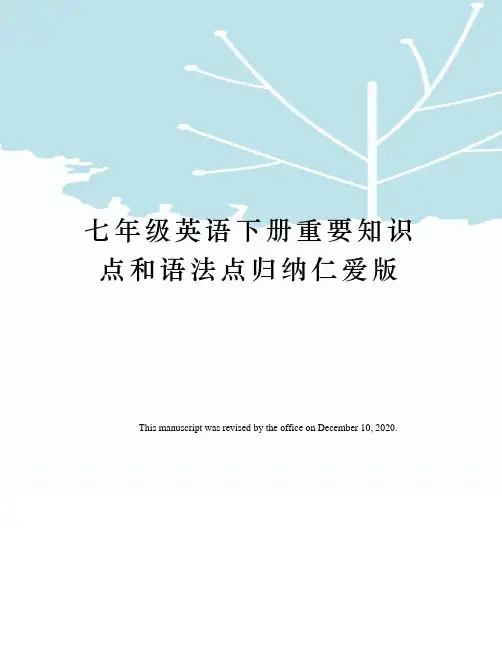
七年级英语下册重要知识点和语法点归纳仁爱版 This manuscript was revised by the office on December 10, 2020.Unit 5 Our School Lifetopic1 How do you go to school一、重点词语:1. wake up 醒来,唤醒get up起床2. go to school 去上学go home 回家3. go dancing / shopping / skating / swimming 去跳舞;购物、滑冰;游泳go doing something 可用于表达去进行某种娱乐休闲活动。
4. 表示交通方式:on foot 步行 by boat 坐船 by ship 坐船 by air 乘飞机by plane 乘飞机by train 坐火车by subway 搭乘地铁by car 坐小汽车by bus 坐公共汽车by bike 骑自行车5. take the subway / bus / car 搭乘地铁;公共汽车;小汽车6. drive a car to work = go to work by car 驾车去上班 take a bus to work = go to work by bus 乘公共汽车去上班go to school on foot = walk to school 步行去上学7. ride a bike / horse 骑自行车;骑马8. after school / class 放学以后;下课以后9. play the piano / guitar / violin 弹钢琴;吉他;小提琴play basketball / soccer / football 打篮球;踢足球;打橄榄球 play computer games 玩电脑游戏 play with a computer 玩电脑play sports 做运动10. next to 紧挨着,在…旁边11. a plan of my school 一幅我们学校的平面图12. on weekdays 在工作日at weekends 在周末13. have breakfast / lunch / supper / dinner / meals吃早餐;中餐;晚餐;正餐;一日三餐have classes / lessons / a meeting 上课;上课;开会14. watch TV / movies / games / the animals 看电视;电影;比赛;动物read novels / newspapers / books 看小说;报纸;书15. wash one’s face / clothes 洗脸;衣服16. 反义词:up – down, early – late 近义词:quickly – fastget up early 早起 be late for 迟到17. the first / second / third / fourth day第一;二;三;四天18. clean the house 打扫房子19. 表示建筑物(尤其学校建筑物):on the playground 在操场at school / home / table 在学校;家里;桌旁in a computer room / teachers’ office / classroom building / gym / library / lab / canteen在电脑室;教师办公室;教学楼;体操馆;图书馆;实验室;食堂20. around six o’clock = at about six o’clock大约在六点21. 频率副词:never, seldom, sometimes, often, usually, always二、重点句型:1. It’s time to get up.该起床的时候了。
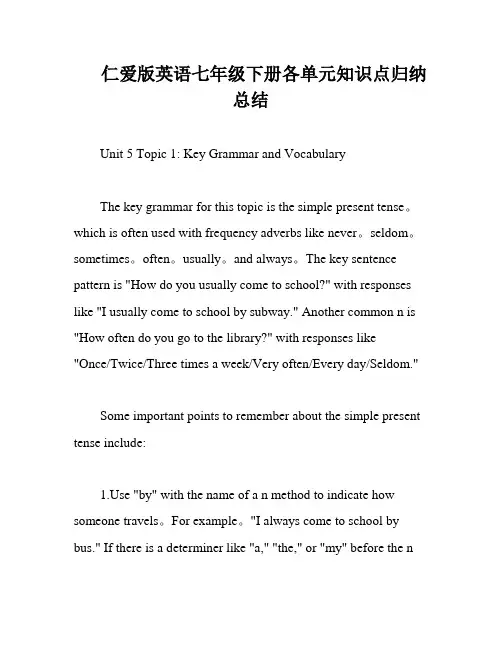
仁爱版英语七年级下册各单元知识点归纳总结Unit 5 Topic 1: Key Grammar and VocabularyThe key grammar for this topic is the simple present tense。
which is often used with frequency adverbs like never。
seldom。
sometimes。
often。
usually。
and always。
The key sentence pattern is "How do you usually come to school?" with responses like "I usually come to school by subway." Another common n is "How often do you go to the library?" with responses like "Once/Twice/Three times a week/Very often/Every day/Seldom."Some important points to remember about the simple present tense include:e "by" with the name of a n method to indicate how someone travels。
For example。
"I always come to school by bus." If there is a determiner like "a," "the," or "my" before the nmethod。
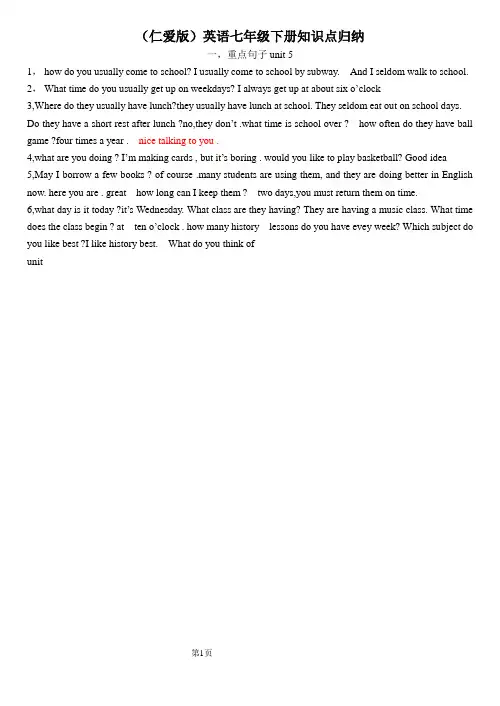
(仁爱版)英语七年级下册知识点归纳一,重点句子unit 51,how do you usually come to school? I usually come to school by subway. And I seldom walk to school. 2,What time do you usually get up on weekdays? I always get up at about six o’clock3,Where do they usually have lunch?they usually have lunch at school. They seldom eat out on school days. Do they have a short rest after lunch ?no,they don’t .what time is school over ? how often do they have ball game ?four times a year . nice talking to you .4,what are you doing ? I’m making cards , but it’s boring . would you like to play basketball? Good idea5,May I borrow a few books ? of course .many students are using them, and they are doing better in English now. here you are . great how long can I keep them ? two days,you must return them on time.6,what day is it today ?it’s Wednesday. What class are they having? They are having a music class. What time does the class begin ? at ten o’clock . how many history lessons do you have evey week? Which subject do you like best ?I like history best. What do you think ofunit一、重点词语:1. wake up 醒来,唤醒get up 起床2. go to school 去上学go home 回家3. go dancing / shopping / skating / swimming 去跳舞;购物、滑冰;游泳go doing something 可用于表达去进行某种娱乐休闲活动。
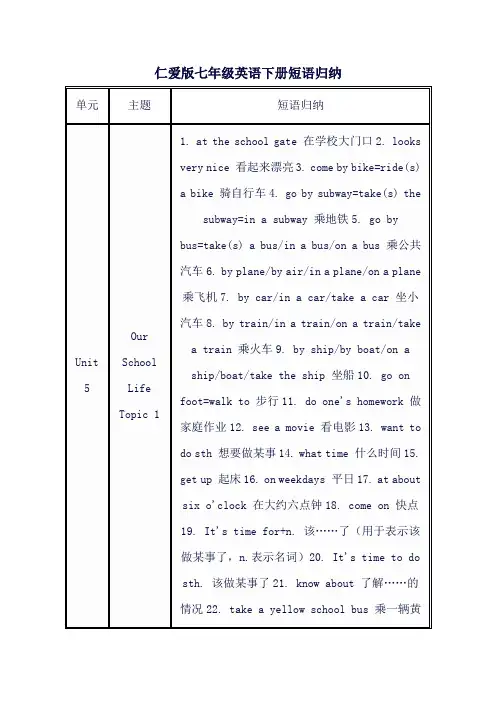
仁爱版七年级英语下册短语归纳 单元 主题 短语归纳
Unit 5 Our School Life Topic 1
1. at the school gate 在学校大门口2. looks very nice 看起来漂亮3. come by bike=ride(s) a bike 骑自行车4. go by subway=take(s) the subway=in a subway 乘地铁5. go by bus=take(s) a bus/in a bus/on a bus 乘公共汽车6. by plane/by air/in a plane/on a plane 乘飞机7. by car/in a car/take a car 坐小汽车8. by train/in a train/on a train/take a train 乘火车9. by ship/by boat/on a ship/boat/take the ship 坐船10. go on foot=walk to 步行11. do one's homework 做家庭作业12. see a movie 看电影13. want to do sth 想要做某事14. what time 什么时间15. get up 起床16. on weekdays 平日17. at about six o'clock 在大约六点钟18. come on 快点19. It's time for+n. 该……了(用于表示该做某事了,n.表示名词)20. It's time to do sth. 该做某事了21. know about 了解……的情况22. take a yellow school bus 乘一辆黄色的校车23. have/has lunch 吃午餐24. eat out 外出吃饭25. on school days 在校期间26. have a short rest 休息一会儿27. after supper/after dinner 晚饭后28. after class 下课后29. after school 放学后30. listen to music 听音乐31. read books 看书32. go to the park 去公园33. go to work 去上班34. class is over 下课了35. in one's free/spare time 在某人的业余时间里36. play basketball 打篮球37. play the piano 弹钢琴38. go swimming 去游泳39. go shopping 去买东西40. how often 多久一次41. four times a year 每年四次42. once/twice a week 每周一次/两次43. three times a week 每周三次44. have ball games 举行球赛45. Work must come first! 工作(学习)第一46. time expressions(时间表达): twenty past six=six twenty 六点二十分;at twenty to six=five forty 在五点四十分;half past seven=seven thirty 七点半;a quarter past five=five fifteen 五点过十五分47. have/has breakfast 吃早餐48. a quarter to ten 十点过十五分49. go/goes to bed 上床睡觉50. drive a car 开小汽车
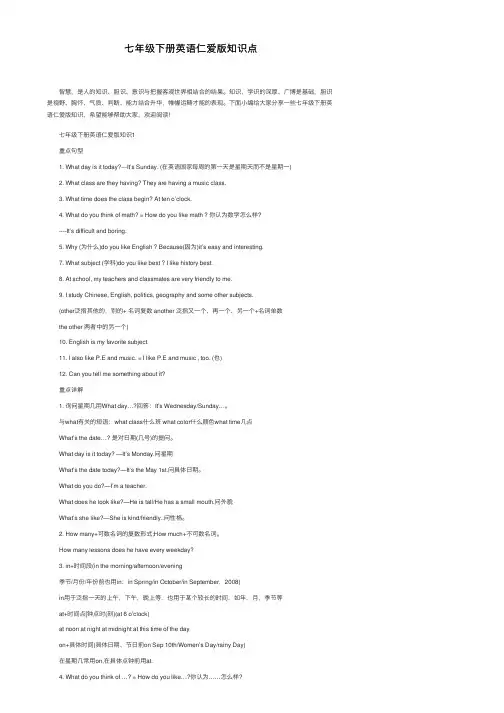
七年级下册英语仁爱版知识点智慧,是⼈的知识、胆识、意识与把握客观世界相结合的结果。
知识,学识的深厚、⼴博是基础,胆识是视野、胸怀、⽓质、判断、能⼒结合升华,帷幄运畴才能的表现。
下⾯⼩编给⼤家分享⼀些七年级下册英语仁爱版知识,希望能够帮助⼤家,欢迎阅读!七年级下册英语仁爱版知识1重点句型1. What day is it today?---It’s Sunday. (在英语国家每周的第⼀天是星期天⽽不是星期⼀)2. What class are they having? They are having a music class.3. What time does the class begin? At ten o’clock.4. What do you think of math? = How do you like math ? 你认为数学怎么样?----It’s difficult and boring.5. Why (为什么)do you like English ? Because(因为)it’s easy and interesting.7. What subject (学科)do you like best ? I like history best.8. At school, my teachers and classmates are very friendly to me.9. I study Chinese, English, politics, geography and some other subjects.(other泛指其他的,别的+ 名词复数 another 泛指⼜⼀个、再⼀个、另⼀个+名词单数the other 两者中的另⼀个)10. English is my favorite subject.11. I also like P.E and music. = I like P.E and music , too. (也)12. Can you tell me something about it?重点详解1. 询问星期⼏⽤What day…?回答:It’s Wednesday/Sunday…。
Unit 1: My School Life- Vocabulary: school subjects, school facilities, school activities, school rules- Grammar: using present simple tense to talk about daily routines and habits- Listening skills: understanding a conversation and identifying main ideas- Speaking skills: introducing oneself, talking about school life and preferencesUnit 2: My Friends and Family- Vocabulary: family members, personal qualities, feelings and emotions- Grammar: using possessive adjectives, comparative and superlative forms of adjectives- Reading skills: understanding a narrative text and identifying main events, characters, and conflicts- Speaking skills: describing people, talking about personal interests and preferencesUnit 3: My Daily Routine- Vocabulary: daily activities, adverbs of frequency, time expressions- Grammar: using present simple tense and adverbs of frequency to talk about daily routines- Listening skills: understanding a dialogue and answering questions about daily activities- Speaking skills: talking about daily routines, making schedulesUnit 4: My Hobbies- Vocabulary: hobbies and leisure activities, likes and dislikes- Grammar: using present simple tense and expressions of frequency to talk about hobbies- Reading skills: understanding a descriptive text and identifying main details and supporting information- Speaking skills: talking about hobbies, discussing preferences and interestsUnit 5: My Home- Vocabulary: rooms and furniture in a house, prepositions of place- Grammar: using there is/are to talk about the presence and absence of objects in a room- Listening skills: understanding a description of a house and answering questions- Speaking skills: describing one's home, giving directions at homeUnit 6: My Pets- Vocabulary: different types of pets, adjectives to describe pets, pet care- Grammar: using can to talk about abilities and possibilities- Reading skills: understanding an informational text and identifying main ideas and supporting details- Speaking skills: talking about pets, describing pet care and responsibilitiesUnit 7: My Daily Weather- Vocabulary: weather conditions, seasons, weather activities- Grammar: using present simple tense and expressions to talk about weather- Listening skills: understanding a weather forecast and identifying weather conditions- Speaking skills: talking about weather, describing seasons and weather activities.。
仁爱版英语七年级下册u7t1知识点本文将详细介绍仁爱版英语七年级下册Unit 7 Topic 1的知识点。
该单元重点介绍了餐厅用语和点餐用语。
以下是每个重点内容的
具体介绍。
一、餐厅用语
1. 餐厅用语主要包括基本用语、餐具用语和服务员用语。
2. 基本用语包括问候语、道歉语、感谢语等。
例如,hello,welcome to our restaurant;I'm sorry;thank you,等等。
3. 餐具用语包括各种餐具的名称。
例如,fork(叉子)、knife (刀)、spoon(勺子)等。
4. 服务员用语包括服务员的各种用语、服务员常用的问题和回
答等。
例如,What can I do for you?(您需要我为您做些什么?);May I take your order?(请问您要点什么?)
二、点餐用语
1. 点餐用语主要包括点餐流程和菜单翻译。
2. 点餐流程包括问询客人口味、点餐、确认菜单等。
例如,Could you please tell me your preference?(请问您喜欢什么口味?);I’d like to order...(我要点...);Is that all?(这些就够了吗?)
3. 菜单翻译包括菜名、酒水、套餐等的翻译。
例如,chicken salad(鸡肉沙拉);orange juice(橙汁);set menu(套餐)。
以上是仁爱版英语七年级下册Unit 7 Topic 1的知识点介绍。
希望本文对学习该单元的同学有所帮助,能够顺利掌握相关内容。
仁爱七年级下册英语知识点仁爱七年级下册英语知识点第1篇usually>often> sometimes>seldom>never等或单位时间内的次数,表示频率的短语:次数+单位时间: once a week一周一次twice a month每月两次three times a year每年三次How often do you go to the library?你多久去一次图书馆?--once/twice/three times/four times a week/month/year(2).How far多远(表示距离)How far is it from here to the zoo? --It’s 6(3).How long多长(对时间进行提问,持续多长时间(多久)/东西的长度(多长)How long did he stay here? About two twoHow long is the river? About 500How long can I keep it? Oneover (形容词) School / Class is What time is the class over?begin 现在分词: beginning 过去式: began What time does the class begin?begin to do sth begin doing sth 开始做某事=start to do sth=start doing sthHe begins to write a =He begins writing alisten to 听(动作) listen to music、listen to the song (to不能忘) 冠词用法弹乐器前要带定冠词the,而进行球类运动则不带the。
play +棋类/球类/牌下……棋,打……球play soccer/basketballplay the +西洋乐器弹/拉……乐器play the guitar/piano序数词,前面要用定冠词the。
Unit 5 Our School Life topic1 How do you go to school? 一、重点词语: 1. wake up 醒来,唤醒 get up 起床 2. go to school 去上学 go home 回家 3. go dancing / shopping / skating / swimming 去跳舞; 购物、滑冰;游泳 go doing something 可用于表达去进行某种娱乐休闲活动。 4. 表示交通方式: on foot 步行 by boat 坐船 by ship 坐船 by air 乘飞机 by plane 乘飞机 by train 坐火车 by subway 搭乘地铁 by car 坐小汽车 by bus 坐公共汽车 by bike 骑自行车 5. take the subway / bus / car 搭乘地铁;公共 汽车;小汽车 6. drive a car to work = go to work by car 驾车去上班 take a bus to work = go to work by bus 乘公共汽车去上 班 go to school on foot = walk to school 步行去上学 7. ride a bike / horse 骑自行车;骑马 8. after school / class 放学以后;下课以后 9. play the piano / guitar / violin 弹钢琴;吉他; 小提琴 play basketball / soccer / football 打篮球;踢足球; 打橄榄球 play computer games 玩电脑游戏 play with a computer 玩电脑 play sports 做运动 10. next to 紧挨着,在 , 旁边 11. a plan of my school 一幅我们学校的平面图 12. on weekdays 在工作日 at weekends 在周末
1 七年级下英语知识点总结 Unit 5 Topic1 ㈠短语总结 1. 在学校大门口 at the school gate 2. 来学校 come to school 3. 去学校 go to school 4. 上课 have class / have classes 5. 步行 on foot 6. 骑自行车 ride a bike/ ride bikes/ by bike / on a bike 7. 坐公交 by bus / take a bus 8. 坐地铁 by subway / take the subway / on the subway 9. 坐飞机 by plane/ take the plane / on the plane 10. 坐小汽车 by car / in a car/ take a car/ drive a car 11. 坐轮船 by ship 12. 坐小船 by boat 13. 坐火车 by train / on the train 14. 在我们组 in our group 15. 一群学生 a group of students 16. 我们中的三个人 three of us 17. 在平日 on weekdays 18. 在周末 on the weekends / at weekends 19. 起床 get up 20. 睡觉 go to bed 21. 早起 get up early 22. 回家 go home 23. 到家 get home 24. 去动物园 go to the zoo 25. 去公园 go to the park 26. 看电影 see a movie / film 27. 看电视 watch TV 28. 在晚上 in the evening / at night 29. 帮助父母 help parents 30. 做某人的家庭作业 do one’s ( my/ her/ his/ your/ their)homework 31. 在学校 at school 32. 知道,了解 know about / learn about 33. 校园生活 school life 34. 一个美国学生 an American student 35. 在美国 in America / in the U.S.A. 36. 许多学生 many students/ a lot of students/ lots of students 37. 很少 very few 38. 吃午饭 have lunch 39. 出去吃饭 eat out 2
40. 在校期间 on school days 41. 休息一会 have a short rest/ break 42. 午饭后 after lunch 43. 在某人的业余时间in one’s ( my/ his/ her/ their…)free/ spare time 44. 打篮球 play basketball 45. 踢足球play soccer / football 46. 弹钢琴 play the piano 47. 弹吉他play the guitar 48. 拉二胡 play erhu 49. 去游泳 go swimming / go for a swim 50. 去划船 go boating 51. 球赛 a ball game / ball games 52. 一年四次 four times a year 53. 听音乐 listen to music 54. 读书 read books 55. 看报 read newspapers 56. 看医生 see a doctor 57. 去图书馆 go to the library 58. 一周两次 twice a week 59. 见朋友 meet friends 60. 每天 every day 61. 在七点半 at half past seven 62. 一小会 for a little while / for a short time 63. 晚饭后 after supper 64. 吃饭 have dinner 65. 吃早饭 have breakfast ㈡重要句型 1. I usually come to school by subway. 同义句: I usually take the subway to school. 对划线部分提问: How do you usually come to school? 类似的有: go to school by bike=go to school on a bike= ride a bike to school=ride to school go home by bus=go home on a bus=take a bus home 2. How do you usually/ often…?你通常/经常怎样…? 3. It’s time for class.=It’s time to have class. =It’s time for having class. 4. What about you? =How about you? 5. How often …? 询问频率 ,回答可以用频率副词:always, usually, often, sometimes, seldom, never, every day ,every +其他时间名词或表示频率的短语回答 表示频率的短语:次数+单位时间 e.g. : once a day / twice a week / three times a month 6. The early bird catches the work. (谚语) 笨鸟先飞 7. Work / Study must come first. 工作/ 学习必须放在第一位! 3
8. Classes begin at eight. =Class begins at eight. 提问: What time does the class begin? / What time do the classes begin? ㈢重要单词的用法 1. look (感官动词) 看起来,后面加形容词 His mother looks very young. They look very cute. Her dress looks very nice. You look very cool in this coat. 2. by 介词 by 后面直接加表示交通工具的名词,中间不用任何词修饰,如:by bike by +动词ing形式,表示通过某种方式 People show love to their mothers by giving cards. You can be a good student by working hard. 3. over (形容词) School / Class is over. 4. begin 现在分词: beginning 过去式: began begin to do sth , begin doing sth He begins to write a letter. =He begins writing a letter. 如果begin本身为分词,只能用begin to do sth He is beginning to run. 5. listen to 听(动作) , hear 听见(结果) 6. always 反义词 never 7. 本话题涉及的时态为一般现在时,句中常有频率副词或表示频率的短语,如果主语为三单,动词一定要用三单! (四)易错题 1. You new watch ______ (look) very nice! 2. Here ______(be) some news. 3. Oh, come on! It’s time_____ going to school. 4. They usually go to school on ________(feet). 5. In my class, forty of _______(we) go to school by bike. 6. The early bird ______ (catch) the worm. 7. Kangkang often _____ (ride) a bike to the park. 8. What time _____ (be)school over? 9. Work must come ______(once). 10. It’s time ____you to get up. 11. We often _____ books in the morning. 12. Jill’s friend like ______(study) in our school. 13. Mr. Wang teaches ______(we) English. _____ of us like him. 14. How about ______(go) out with me? 15. Most students go to school _____ the school bus. 16. _______ do you go shopping with your mother? A. How soon B. How far C. How often D. How much 17. What time do you usually get up _____ weekdays?